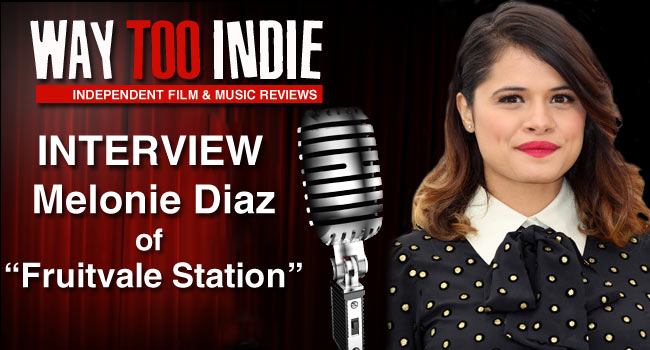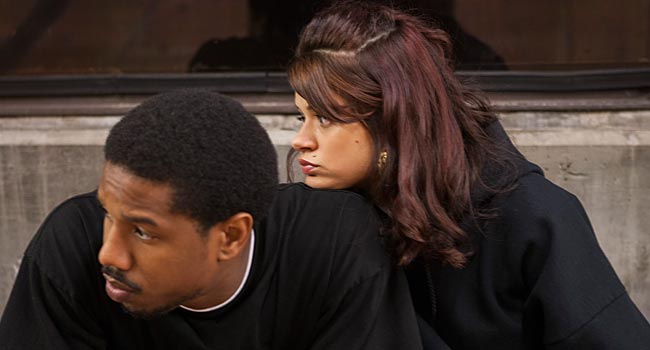Interview: Melonie Diaz of Fruitvale Station

We spoke to star Melonie Diaz (Be Kind Rewind, A Guide to Recognizing Your Saints), who plays Sophina Mesa, Oscar’s real-life girlfriend, in a tiny roundtable interview the day after the film’s premiere in Oakland. She talked with us about her chemistry with Michael B. Jordan, what she thinks of the Bay Area, what it was like meeting Sophina, the tremendous support the film’s received, and more. Check out the edited transcript below.
Read More Fruitvale Station Interviews:
Michael B. Jordan and Octavia Spencer
Ryan Coogler
Ahna O’Reilly
What was your reaction to first reading the script, and how familiar were you with the Oscar Grant story?
I’d never heard about the story before. I’m from the East Coast, so I was completely infuriated. How could something like this have gone under the radar the way that it did? I [watched] the Youtube video, and it pissed me off even more. I Skyped with Ryan (Coogler), and he’s obviously a young person with so much passion and conviction. He knew the story in and out, and [his reasons for wanting to make the movie] were better than anything I’d heard. I said I want more than anything to be a part of this project.
You and Michael have great chemistry. How was it working with him?
We were lucky—we were able to come to the Bay a little earlier and we’d just hang out. My biggest pet peeve is when you work on a movie and you meet somebody and they’re like, “Alright, you’re husband and wife. Act!” It was really important for us to have time spent. There’s something really simple about it, but it makes all the difference. We went to a basketball game, cooked together, ate food, and drank a lot— little things like that where you really get to know a person.
What do you think of the Bay?
I freaking love the Bay! I had the best time here. I mean, I was working all the time, but I like the vibe and there’s a community here. Before I came people kind of gave it a bad rap.
(laughs) What did they say?
Oakland does have a big crime rate. It’s kind of unfortunate that that’s the front page of the city. It’s a great freaking city.
What was it like meeting Sophina (Mesa, Oscar Grant’s girlfriend)?
Intense. I get emotional about it. It sucks. I think she’s as much a victim as Oscar is. She’s an example of so many women who have to raise their family alone and have to tell their daughters what happened to their dad. It’s heavy.
When did you watch the film for the first time?
I watched it with my mom on my computer.
How was that compared to watching it with an audience at Sundance and Cannes?
Completely different. Watching it by myself I was more self-consumed like, “Ah! I don’t want to watch myself!” Every actor does that. Watching it at Sundance, Cannes, and even yesterday (at the Oakland premiere), I think it’s somewhat the same. People are equally angry and moved, and that’s why the story is universally important. I think people are really identifying with Oscar. Everybody knows what it’s like to be 22, be a mess, not know who you are, be in a difficult relationship, and try to make all the things that are wrong around you right.
Were you expecting the crowd at Cannes to react the way they did?
No, because I know the French community is quite fickle. They’ve booed a number of films over the years. The French…their taste is so high class, so there was a lot of pressure going in. To have a standing ovation for ten minutes and have people respond in a different country…it kind of made us feel like we were on to something special. Also, I think the French like to agree with everything that’s wrong with America, and the movie touches upon the things that are wrong in this society right now, whether it’s racial profiling or gun control.
What was your approach to the script?
I wanted to approach it from the family dynamic side. The movie is about social injustice, but it’s also about family and what it’s like to be in a relationship and have a daughter. I wanted to show that [Oscar] was a family man and he was a good person. I gave my dentist a ticket to the movie and she emailed me afterwards. She said, “I can’t wait to go home and hug my son.” That’s so powerful, and that’s what we wanted to show. He’s a person we all loved.

Talk a bit about Ryan and what it’s like working with him as an actor.
It’s so rare for me to work with a director so close to my age. He’s actually younger than me. That’s never happened before. He has more conviction and passion in one finger than all of us. It kind of blows my mind. The process of making this movie was not easy. There were a lot of emotional days where we’re all screaming, crying, angry, but you feel incredibly safe. He protects you. Even on a low indie budget movie where you have no time, I never saw him sweat. You never want your director to sweat. Working on a project like this where you’re so invested and going through these emotional ups and downs…you’re a little bit of a wreck. It’s nice to have somebody on your side like him because you know no matter what he’s going to have your back.
I remember the day before all the BART scenes I emailed him saying I was scared. He wrote me this long, eloquent email of reasons why I should not be scared. He doesn’t have any time, and he’s writing me this long…he has my back, and it’s really refreshing for a young director to have that much care for his actors.
What was it like when the film won the awards at Sundance?
I was like, “OH. MY. GOD.” This movie is so topical. I did this movie called American Son, which is about this kid’s last day before he goes off to war. People didn’t want to buy it after Sundance. It was almost as if they were in shock. They didn’t really want to deal with the issues. So, when Fruitvale won, I was like, wow, people actually want to have a conversation about these things that are affecting us on a daily basis. I wasn’t sure, even while making the movie—we’re taking a risk, making a movie about something that may not [get everybody to respond.] To have people respond the way they’ve been responding is completely bonkers.
Do you approach a role as a real person the same way you would approach a fictional character?
I think when you’re playing a real person there’s not as much room to play. You have to respect that person for who they are and be honest about what they bring to the table. It’s not really about you. It’s about bringing their qualities out.
The beautiful thing about the movie is that you show that you show Oscar, flaws and all. Your character is sort of like a surrogate for the audience. There’s a great scene where you’re angry with Oscar, pointing out all of his flaws…but you end up forgiving him.
[When] I met Sophina, the one thing that was most apparent to me was how much she loved him. That was the love of her life. That was her best friend—she knew him better than anyone, I think. I truly believe that, and Ryan believes that, too. I don’t know what it is to lose somebody like that, but I know what it’s like to love somebody like that. When you love somebody like that, your love is unconditional, and that was the through-line for Sophina. She’s a loyal, loving mother and companion. I’m not married and I don’t have a child, but I think after getting to know her, that’s the foundation of who she is.
When you first read the script, was there a scene that stood out to you?
The scene with Octavia and Mike in the jail. That’s the scene that made me want to do this movie. I still get emotional about it. It’s so fucked up! The scene that makes me cry every time is the scene with the dog. That’s when I start to crumble. It’s foreshadowing the inevitable death [of Oscar.]
How do you suppress your expectations when heading into a project like this?
I don’t think you should ever expect anything. I don’t care if you’re in a 50 million dollar budget movie. It’s about the work. It’s about making the best movie you can possibly make. If you get the accolades, great. But if not…whatever. People shouldn’t be in it for that. That’s why I think this movie is so successful, because nobody cared about that crap. We actually cared about Oscar.
